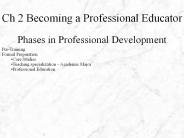On Becoming a Counselor - PowerPoint PPT Presentation
1 / 11
Title:
On Becoming a Counselor
Description:
On Becoming a Counselor One of the most important instruments you will have to work with as a counselor is yourself as a person. G. Corey, 2005 – PowerPoint PPT presentation
Number of Views:51
Avg rating:3.0/5.0
Title: On Becoming a Counselor
1
On Becoming a Counselor
- One of the most important instruments you will
have to work with as a counselor is yourself as a
person. - G. Corey, 2005
2
To every therapy session we bring our human
qualities and the experiences that have
influenced us.
3
The Role of Values in Counseling
- A core issue is the degree to which counselors
values should enter into a therapeutic
relationship. - Counselors should guard against the tendency to
assume either of two extreme positions - At one extreme, counselors hold definite absolute
beliefs, and see it as their job to exert
influence on clients to adopt their values. - At the other extreme are counselors who maintain
that they should keep their values out of their
work, and that the ideal is to strive for value
free counseling.
4
The Rule of Values in Counseling
- Because counseling is a process that teaches
clients how to deal with their problems and find
their own solutions based on their value system,
it is essential that the counselor not
short-circuit a clients exploration.
5
Who should establish the goals of counseling?
6
Where does a counselor begin to develop
therapeutic goal?
- The client and a counselor need to explore what
they hope to obtain from the counseling
relationship, whether they can work with each
other, and whether their goals are compatible. - What you expect from counseling?
- Why are you here?
- What do you hope to leave with?
- What aspects of yourself or your life situation,
would you most like to change?
7
Incorporating Culture Into Counseling Practice
- Suspends preconceptions about clients race,
and/or ethnicity and that their family members. - Engage clients in conversations about race and
ethnicity to avoid stereotyping and making faulty
assumptions. - Address how race and ethnic differences between
therapist and client might affect the therapy
process. - Acknowledge that power, privilege, and racism can
affect interactions with clients. - Recognize that the more comfortable therapists
are with conversations about race and ethnicity,
the more easily they can respond appropriately to
clients who may be uncomfortable with such
discussions. - Be open to ongoing learning about cultural
factors, and how they affect therapeutic work.
8
It is more often by differences than by
similarities that we are challenged to look at
what we are doing.
9
Multicultural Guidelines
- Learn more about how your own cultural background
has influenced your thinking and behaving. - Identify your basic assumptions, especially as
they apply to diversity in culture, ethnicity,
race, gender, class, religion, and sexual
orientation. - Examine where you obtain your knowledge about
culture. - Learn to pay attention to common ground that
exists among people of diverse backgrounds. - Spend time preparing clients for counseling.
- Be flexible in applying the methods you use with
clients. - Remember that practicing from a multicultural
perspective can make your job easier, and can be
rewarding for both you and your clients.
10
Issues Faced by Beginning Counselor
- Dealing with our anxieties
- Being and disclosing ourselves
- Avoiding perfectionism
- Being honest about our limitations
- Understanding silence
- Dealing with demands from clients
- Dealing with clients who lack commitment
- Tolerating ambiguity
- Avoiding losing ourselves in our clients
- Developing a sense of humor
- Sharing responsibility with the client
- Declining to give advice
- Defining your role as a counselor
- Learning to use techniques appropriately
- Developing your own counseling style, staying
alive as a person and as a professional
11
Basic Parts of a Theory
- View of Human Nature 3 Modalities
- Cognition
- Behavior
- Affect































